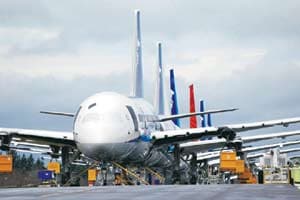Aviation regulator Directorate General of Civil Aviation is mulling one-time surveillance for all domestic airlines to monitor passenger safety. “We have taken permission for one-time surveillance from the Director General to monitor flight operations quality assurance (FOQA),” said a senior DGCA official.
This action was taken after state-owned Air India was unable to provide the required data for its flight AI-513, which risked passengers’ lives on its Bengaluru-Hyderabad flight. The aircraft touched and bounced off the runway while making a landing attempt.
On a complaint of a passenger, the DGCA started a probe, only to realise that Air India did not have digital flight data recording (DFDR), which furnishes all details of the flight, including temperature, take-off and landing details, cabin pressure, and weather report.
DFDR data, the DGCA official said, should be retained for each and every flight, for both Air India and other private airlines, for at least six months. In respect to this, a showcause notice has been furnished to AS Soman, director of flight safety. The aircraft maintenance officer on duty has been suspended, said the DGCA official.
However, there is little that the DGCA can do in this matter. “The probe is on, but in absence of the data there is little we can do. There is not much evidence,” the official said.
In January, US aviation regulator, Federal Aviation Authority, had downgraded India to category-2 under International Aviation Safety Assessment — stating that India’s safety oversight regime does not meet international safety standards, and that India did not have enough flight information officers. It made India one of 16 countries rated as Category-2, including Bangladesh, Indonesia, Ghana and Philippines. Even though a few months later India’s rating was upgraded to Category-1, incidents such as that of Air India throw light on air safety issues in the country.

